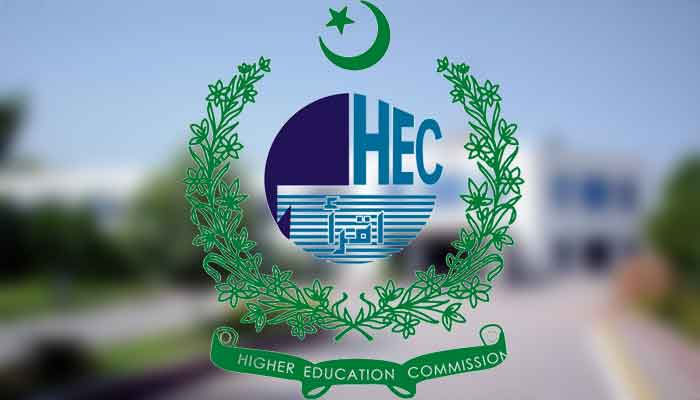HEC denounces cut in higher education budget
ISLAMABAD: The governing body of the Higher Education Commission (HEC) on Saturday deplored the sudden cut in the higher education budget by another Rs5.90 billion from the committed indicative budget ceiling of Rs70 billion for fiscal year 2020-21, and emphasised that the move will dismantle the country’s higher education system by forcing the shutdown of universities, which are already suffering from historically unprecedented budgetary shortfalls and the impact of the COVID-19 crisis.
The reaction of the HEC governing body was shared after its two-day 36th meeting which concluded on Saturday. The HEC Chairman Tariq Banuri chaired the meeting, which was conducted online.
The Commission members stressed upon the government to reconsider its decision, and take immediate steps to appropriately fund the universities in order to protect access to and quality of higher education. The Commission stressed that without adequate investment on higher education, the youth of Pakistan will never acquire the competencies needed to develop and compete internationally.
Meanwhile, the HEC thoroughly reviewed the Commission funding formula for universities, took into account various proposals, and decided that for FY-2020-21, the actual total allocation of FY-2019-20 will be treated as base plus need grants, accounting for 85 percent of the total allocation, while the remaining 15 percent will be treated as a performance grant, allocated on the basis of the number of publications, the number and amount of research grants received, as well as number of PhD faculty and students. It was also agreed that for FY 2021-22 and beyond, a new funding methodology will be developed on the principles of equity, needs and credit for performance.
The Commission amended the Tenure Track Statutes by indexing TTS salaries to the comparable BPS scale plus a 35% TTS Premium, thus introducing automatic adjustments of future TTS salaries in line with increases in BPS salary scales. Consistent with the international practice, the Commission increased the maximum time limit for the tenure decision from the current six years to nine years, and endorsed collection of granular data of TTS faculty separately in Higher Education Management Information System (HEMIS) to help universities and HEC maintain proper oversight over the progress of TTS faculty, and improve transparency and fairness of recruitment, promotion and tenure.
The Commission appreciated the comprehensive work done by the HEC in wake of the COVID-19 pandemic, to minimise academic disruption, develop and guide universities to acquire online readiness, provide supplementary resources of Rs1.20 billion, deploy live dashboard to monitor quality of online delivery, build free online academic content and
resources, and motivate students to continue learning.
The Commission impressed upon the government to support HEC initiatives viz. Taleem Bundle, University Support Package, etc., and advised the HEC to resolve connectivity issues faced by students, and use platforms such as virtual think tanks to carve out imaginative solutions.
The Commission also approved revised HEC Policy on Protection against Sexual Harassment in Higher Education Institutions 2020, which reflects significant improvement from its 2011 anti-sexual harassment guidelines in terms of enforcement, simplicity, scope, definition of prohibited conduct, consistency with national act for Protection of Women against harassment as workplace, and appellate process. The HEC also adopted the “Safe Campus Acceptable Usage Policy 2020” to protect the privacy of students and avoid possibilities of harassment because of the installation, placement or use of security cameras within the universities and campuses.
The Commission appointed Kamran Rasool, former interior secretary and former chief secretary Punjab, in an honorary capacity as the chairman of the Board of Governors of the Education Testing Council (ETC) considering his professional eminence and implacable integrity.
-
 AI Superintelligence Race: Meta And Microsoft Back Rival Visions—Who Will Win?
AI Superintelligence Race: Meta And Microsoft Back Rival Visions—Who Will Win? -
 Chatbots Push Users Into ‘delusional Spirals,’ Experts Warn
Chatbots Push Users Into ‘delusional Spirals,’ Experts Warn -
 Economist Slams AI Doom Predictions, ‘replacing Humans Is Not Innovation’
Economist Slams AI Doom Predictions, ‘replacing Humans Is Not Innovation’ -
 KATSEYE's Manon Bannerman Takes Break From Group For Personal Reasons
KATSEYE's Manon Bannerman Takes Break From Group For Personal Reasons -
 Prince Harry's Reaction On 'disgraced' Uncle Andrew Arrest Revealed
Prince Harry's Reaction On 'disgraced' Uncle Andrew Arrest Revealed -
 Eric Dane’s Friends Initiate GoFundMe To 'support' His Two Daughters After His Death At 53
Eric Dane’s Friends Initiate GoFundMe To 'support' His Two Daughters After His Death At 53 -
 Internet Erupts After Candace Owens Claims Elon Musk And Sam Altman Are ‘not Human’
Internet Erupts After Candace Owens Claims Elon Musk And Sam Altman Are ‘not Human’ -
 Will Princess Beatrice, Eugenie Stay In Contact With Andrew? Source Speaks Out
Will Princess Beatrice, Eugenie Stay In Contact With Andrew? Source Speaks Out -
 ‘AI Revolution Is Coming Fast & US Has No Clue,’ Bernie Sanders Warns Of Speed Of Disruption
‘AI Revolution Is Coming Fast & US Has No Clue,’ Bernie Sanders Warns Of Speed Of Disruption -
 Hong Kong Touts Stability,unique Trade Advantages As Trump’s Global Tariff Sparks Market Volatility
Hong Kong Touts Stability,unique Trade Advantages As Trump’s Global Tariff Sparks Market Volatility -
 ‘Miracle On Ice’ Redux? US Men Chase First Olympic Hockey Gold In 46 Years Against Canada
‘Miracle On Ice’ Redux? US Men Chase First Olympic Hockey Gold In 46 Years Against Canada -
 Friedrich Merz Heads To China For High Stakes Talks In An Effort To Reset Strained Trade Relations
Friedrich Merz Heads To China For High Stakes Talks In An Effort To Reset Strained Trade Relations -
 Astronauts Face Life Threatening Risk On Boeing Starliner, NASA Says
Astronauts Face Life Threatening Risk On Boeing Starliner, NASA Says -
 Hailey Bieber Reveals How Having Ovarian Cysts Is 'never Fun'
Hailey Bieber Reveals How Having Ovarian Cysts Is 'never Fun' -
 Kayla Nicole Looks Back On Travis Kelce Split, Calls It ‘right Person, Wrong Time’
Kayla Nicole Looks Back On Travis Kelce Split, Calls It ‘right Person, Wrong Time’ -
 Prince William And Kate Middleton Extend Support Message After Curling Team Reaches Olympic Gold Final
Prince William And Kate Middleton Extend Support Message After Curling Team Reaches Olympic Gold Final




